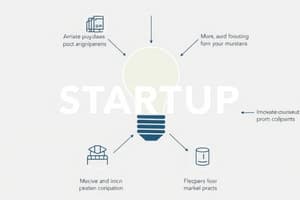Podcast
Questions and Answers
What is a primary characteristic of a startup?
What is a primary characteristic of a startup?
- Low market competition
- Focus on creating innovative solutions (correct)
- Stable revenue from the outset
- Limited potential for growth
Which type of startup is specifically designed to grow rapidly and scale quickly?
Which type of startup is specifically designed to grow rapidly and scale quickly?
- Social Startups
- Lifestyle Startups
- Scalable Startups (correct)
- Small Business Startups
During which stage of development is initial funding sought to develop a prototype or service?
During which stage of development is initial funding sought to develop a prototype or service?
- Ideation
- Seed Stage (correct)
- Startup Stage
- Expansion
Which of the following is a key consideration for startup success?
Which of the following is a key consideration for startup success?
What is a significant challenge that startups face?
What is a significant challenge that startups face?
What is the focus of social startups?
What is the focus of social startups?
Which factor is considered a success factor for startups?
Which factor is considered a success factor for startups?
Why do startups generally rely on outside financing?
Why do startups generally rely on outside financing?
Flashcards are hidden until you start studying
Study Notes
Definition
- A startup is a newly established business, typically in its early stages of operation.
- Often centered around a unique product, service, or technology.
Characteristics
- Innovation: Focus on creating innovative solutions or products.
- Growth Potential: High potential for growth and scaling operations rapidly.
- Uncertainty: High levels of market and business uncertainty.
- Funding Needs: Generally relies on outside financing to grow (e.g., venture capital, angel investors).
Types of Startups
- Small Business Startups: Traditional businesses aiming for steady growth and sustainability.
- Scalable Startups: Startups designed to grow rapidly and scale quickly (often tech-oriented).
- Social Startups: Focus on social issues, aiming for both impact and profit.
- Lifestyle Startups: Built around the founders' lifestyle choices and interests.
Stages of Development
- Ideation: Generation and validation of the business idea.
- Seed Stage: Initial funding to develop a prototype or service.
- Startup Stage: Product development and market entry.
- Growth Stage: Rapid scaling, increasing market share, and customer acquisition.
- Expansion: Expanding product lines or entering new markets.
Key Considerations
- Business Model: Clearly defined revenue streams and customer value propositions.
- Target Market: Identifying and understanding the target audience.
- Funding Strategy: Choosing between bootstrapping, venture capital, crowdfunding, etc.
- Team Composition: Strong founding team with diverse skills is essential for success.
Challenges
- Market Competition: Intense competition from established companies and other startups.
- Cash Flow Management: Balancing income and expenses to avoid financial strain.
- Regulatory Compliance: Adhering to legal requirements and regulations.
Success Factors
- Adaptability: Ability to pivot and adjust the business model as needed.
- Customer Feedback: Leveraging customer feedback for product development.
- Networking: Building a strong network for support, mentorship, and resources.
Conclusion
- Startups play a crucial role in innovation and economic growth but face unique challenges and risks that require careful planning and execution.
Startup Definition
- A newly established business, usually in its early stages of operation.
- Often focuses on a unique product, service, or technology.
Startup Characteristics
- Emphasizes innovation and creating new solutions.
- Possesses high growth potential with a goal of rapid scaling.
- Involves significant market and business uncertainty.
- Relies heavily on external funding sources like venture capital or angel investors.
Startup Types
- Small Business Startups: Aim for steady growth and long-term sustainability.
- Scalable Startups: Designed for rapid expansion and are often technology-driven.
- Social Startups: Prioritize social impact alongside profitability.
- Lifestyle Startups: Aligned with the founders' personal interests and lifestyle.
Startup Development Stages
- Ideation: Involves generating and validating a business idea.
- Seed Stage: Securing initial funding to develop a prototype or service.
- Startup Stage: Characterized by product development and market entry.
- Growth Stage: Focuses on rapid scaling, expanding market share, and customer acquisition.
- Expansion: Involves expanding product lines or entering new markets.
Crucial Startup Considerations
- Business Model: A well-defined plan for generating revenue and delivering value to customers.
- Target Market: Identifying and deeply understanding the intended customer base.
- Funding Strategy: Selecting the most suitable funding approach, such as bootstrapping, securing venture capital, or utilizing crowdfunding.
- Team Composition: Assembling a strong founding team with complementary skillsets is essential.
Startup Challenges
- Market Competition: Facing intense competition from established companies and rival startups.
- Cash Flow Management: Maintaining a balance between income and expenses to avoid financial difficulties.
- Regulatory Compliance: Adhering to legal requirements and regulations.
Startup Success Factors
- Adaptability: The ability to adapt and adjust the business model as needed.
- Customer Feedback: Utilizing customer input to drive product development and improvement.
- Networking: Building relationships for support, mentorship, and accessing valuable resources.
Startup Conclusion
- Startups drive innovation and economic growth but face unique challenges and risks.
- Success requires meticulous planning and execution.
Studying That Suits You
Use AI to generate personalized quizzes and flashcards to suit your learning preferences.




